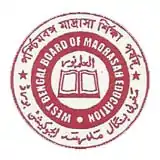West Bengal Board of Madrasah Education
The West Bengal Board of Madrasah Education is the state government administered autonomous examining authority for affiliated and recognized madrasahs in West Bengal, India.[1] Perhaps among the oldest post-secondary boards in India, it is the only madrasah board that is recognized by the Government of India.
পশ্চিমবঙ্গ মাদ্রাসা শিক্ষা পর্ষদ | |
 | |
| Abbreviation | WBBME |
|---|---|
| Motto | .n |
| Established | 1927 |
| Type | Government Organisation |
| Legal status | Active |
| Headquarters | Begum Rokaiya Bhavan, 18, Haji Md. Mohsin Square, Kolkata – 700016 |
President | Md. Fazle Rabbi |
| Website | http://wbbme.org/ |
There are two categories of Madrasah education system in West Bengal. One is High Madrasah Education System and other one is Senior Madrasah Education System. The High Madrasah Education System is a modern education system following by Maulana Abu Nasar Md. Waheed and Senior Madrasah Education System is an upper primary label madrasah from class V to VIII.
Indian democratic set up and constitutional safeguards respect the rights of minorities and it has been placed under Article 29 and 30 in the part- III of the Indian Constitution. In this context Muslim Community is regarded as minority Community which is entitled to enjoy the Provision of Article 29 & 30 of Part – III of the Constitution. Article "29. (1) Any section of the citizens residing in the territory of India or any part thereof having a distinct language, script or culture of its own shall have the right to conserve the same. (2) No citizen shall be denied admission into any educational institution maintained by the State or receiving aid out of State funds on grounds only of religion, race, caste, language or any of them."[2] Article "30. (1) All minorities, whether based on religion or language, shall have the right to establish and administer educational institutions of their choice. 1[(1A) In making any law providing for the compulsory acquisition of any property of an educational institution established and administered by a minority. referred to in clause (1), the State shall ensure that the amount fixed by or determined under such law for the acquisition of such property is such as would not restrict or abrogate the right guaranteed under that clause.] (2) The State shall not, in granting aid to educational institutions, discriminate against any educational institution on the ground that it is under the management of a minority, whether based on religion or language."[2]
Composition of the Madrasah Board
The Board shall consist of the following members: -
(a) the President;
(b) the President of the West Bengal Council of Higher Secondary Education, ex officio;
(c) the President of the West Bengal Board of Secondary Education, ex officio;
(d) the President of the West Bengal Board of Primary Education, ex officio;
[(e) the Director of Madrasah Education, West Bengal, ex officio]
(f) the Head of the Department of Arabic, Calcutta University, ex-officio;
(g) the representative of Vice-Chancellor Allah University, ex officio;]
(h) two heads of recognized Madrasahs—one High Madrasah and one Senior Madrasah—nominated by the State Government;
(i) two Members of the West Bengal Legislative Assembly nominated by the State Government;
(j) three persons nominated by the State Government of whom -
(i) one shall be a whole time member of the teaching staff of a college imparting instruction in Arabic or Persian language and affiliated to any University in West Bengal,
(ii) one shall be an expert in Islamic Culture and Theology, and
(iii) one shall be a woman interested in Madrasah Education;
(k) [eleven] whole time and permanent members of the teaching staff of recognized Madrasahs—five from High Madrasahs, three from Senior Madrasahs and two from Junior High Madrasahs [and one from Primary Madrasah] — elected in the manner prescribed;
(l) two persons from the whole time and permanent non teaching staff of recognized Madrasahs elected in the manner prescribed;
(m) one person from the whole time and permanent staff of the Board elected in the manner prescribed.[3]
See also
References
- Madrasah education
- The Constitution of India. New Delhi: Government of India, Ministry of Law And Justice (Legislative Department). 2015. pp. 14–15.
- "West Bengal Board Of Secondary Education Act, 1963". www.bareactslive.com. Retrieved 1 January 2021.